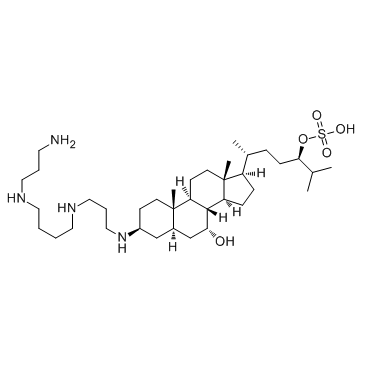| Description |
MSI-1436 is a selective, non-competitive inhibitor of the enzyme protein tyrosine phosphatase 1B (PTB-1B), with an IC50 of appr 1 μM, 200-fold preference over TC-PTP (IC50, 224 μM).
|
| Related Catalog |
|
| Target |
IC50: 1 μM (PTB-1B), 224 μM (TC-PTP)[1]
|
| In Vitro |
In HepG2, MSI-1436 (10 µM, 30 min) alone has no effect on phosphorylation of IRβ, but in conjunction with 100 nM insulin, MSI-1436 increases p-IRβ 18-fold over untreated cells and by approximately threefold over cells treated with insulin alone. MSI-1436's inhibition of TCPTP is approximately two logs less than the effect on PTP1B activity, with a resulting IC50 value of 224 µM[1]. MSI-1436 (Trodusquemine, 10 μM) restores ERK phosphorylation in response to mGluR1/5 agonist DHPG in F11 neuronal cells. MSI-1436 (10 uM) rescues DHPG-induced holding currents and restores DSI in LMO4KO BLA neurons[2]. MSI-1436 (0.1-100 µM) blocks PTP1B activity, has insulin-mimetic effects in cultured neuronal cells[3].
|
| In Vivo |
MSI-1436 (10 mg/kg, i.p.) causes obesity-dependent body weight, reduces total body fat content and adipocyte size and lipid content of white adipose tissue of mice. MSI-1436 treatment significantly reduces plasma insulin levels. MSI-1436 (10 mg/kg, i.p.) increases phosphorylation of STAT-3 2.7-fold and, in conjunction with 100 U/kg insulin, p-IRβ increases threefold over insulin alone-treated rats[1]. MSI-1436 (Trodusquemine) exhibits anxiolytic effect through a restoration of endocannabinoid (eCB) signaling within the amygdala[2]. MSI-1436 (5 mg/kg, i.p.) has an anti-diabetic effect on diabetic mice, and is sufficient to suppress food intake and cause weight loss in CD1 mice[3].
|
| Animal Admin |
Mice Male AKR/J mice are randomLy placed on ad libitum 10, 45, or 60% fat kcal diets. After -14 weeks, mice are randomly assigned to three treatment groups (n=5-8 mice/group); MSI-1436 (initial dose of 10 mg/kg with three subsequent weekly doses of 5 mg/kg, intraperitoneally), vehicle (saline, 10 mL/kg, weekly 4×), or pair-fed (PF). PF animals are injected with saline (weekly 4×) and allotted the amount of food consumed daily by MSI-1436-treated animals. On day 23, mice are anesthetized and euthanized for blood and tissue collection, respectively. Plasma is obtained following centrifugation of blood 14,000 rpm for 10 min at 4°C. Rats Nine-week-old male Sprague-Dawley rats (225-260 g) with ad libitum access to normal rodent chow are dosed intraperitoneally with MSI-1436 (10 mg/kg, IP) or saline. After an overnight fast, the rats are dosed intraperitoneally with saline or 100 U/kg of insulin. At 30 min after dose, animals are killed, and hypothalami are harvested and homogenized in 1 mL of tissue extraction reagent plus phosphatase and protease inhibitors. Samples are centrifuged (14,000 rpm for 10 min at 4°C), and the protein content of the supernatants are quantitated via BCA kit.
|
| References |
[1]. Lantz KA, et al. Inhibition of PTP1B by trodusquemine (MSI-1436) causes fat-specific weight loss in diet-induced obese mice. Obesity (Silver Spring). 2010 Aug;18(8):1516-1523. [2]. Qin Z, et al. Chronic stress induces anxiety via an amygdalar intracellular cascade that impairs endocannabinoid signaling. Neuron. 2015 Mar 18;85(6):1319-31. [3]. Qin Z, et al. Functional properties of Claramine: a novel PTP1B inhibitor and insulin-mimetic compound. Biochem Biophys Res Commun. 2015 Feb 27;458(1):21-7.
|
